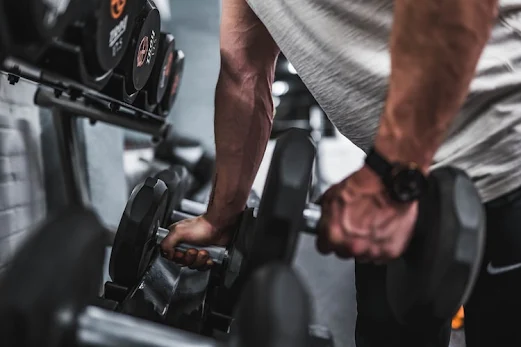Working Out On An Empty Stomach – Is It Good For You?
Could exercising on an empty stomach help you lose weight? This is a hot topic among exercise fitness enthusiasts. Exercising on an empty stomach, for some people, is just not an acceptable idea. Some school of thoughts encourage you to exercise on an empty stomach first thing in the morning, usually waking up and rolling out of bed go-to work out in a fasted state.
RELATED: Benefits Of Exercise
Exercising on an empty stomach is also called fasted
state, fasted cardio, or state of fasting. British Journal of Nutrition
establishes and published a study content that those who exercise without
eating burned fat nearly up to 20 percent faster than those who ate before
workouts.
However, exercising in this way may not only make it
less beneficial, because you do not have the energy necessary for a
high-intensity workout, but your body also starts using the content of muscle
mass to take stored energy fuel.
Research shows that for those including at least 30
percent of the protein in their first meal, their body fat percentage is
lower. Exercising when your body is dehydrated and without glycogen will make
it more difficult to burn more fat. Without the energy of a healthy diet, your
muscles will not have enough glycogen energy fuel for heavy workouts.
Is
Working Out On An Empty Stomach Good?
We can define an empty stomach in various ways. This
means waiting a long time after eating before exercising to minimize digestive
issues during exercise. For example, waiting at least 60 minutes to 90 minutes
after a light meal can be beneficial before doing fasted cardio exercises like
running.
ALSO: How To Make Natural Viagra Using Only 2 Ingredients
Different people work well in different
circumstances and decide whether someone should eat or what diet they should
follow before fat-burning training, it depends largely on what works best for
you.
While there is research to support work on an empty
stomach, this does not necessarily mean that it is ideal. Your body stores
about 2,000 calories as glycogen and much more in stored fat.
Most studies showed no difference in performance
between those who ate before high-intensity exercises that lasts less than an
hour and those who did not.
In contrast, exercising on an empty stomach also has
its downsides. By skipping a meal before strenuous activity, your stomach will
not growl with hunger and it will also contract more easily.
Exercising while hungry can cause a dramatic change
in your blood glucose, and can increase the chance that you may feel nauseated,
dizzy, or lightheaded. You might even be fainting, which increases the risks of
a fall or other serious injury.
Some research also points to another potential
downside. If you don’t have food in your body, your body won’t necessarily
start burning fat.
In a 2015 study, working out in the morning after a
night sleep might increase cortisol levels. The study figured out that
exercising on an empty stomach can have some undeniable drawbacks with your
muscles.
Instead, your body may begin to break down muscle
tissue leading to an overall, long-term loss of muscle mass.
In contrast, a study carried out by health
scientists at the universities of Bath and Birmingham showed that by the timing
of eating and exercising, people can manipulate their blood sugar levels.
This research is conducted in six weeks, with 30 men
classified as overweight or obese. The result was compared between 2 groups:
intervention groups (those who eat breakfast after workouts) and the normal
groups (who do not change their lifestyle). People working out before breakfast
can burn twice the fat amount as the normal group. This type of exercise didn’t
affect weight loss, but it did improve overall health. Read to find out more
about ways to lose weight effectively.
Benefits Of Working Out On An Empty Stomach
Burn Fat Faster.
When your body is in a state of fasting, your body
fat is converted into energy. In one study, 12 active men who ran either after
breakfast or while they are fasting from the night before were evaluated. It
showed that starting your workout before breakfast could result in losing more
fat without adding extra calories later. (ALSO: How To Quickly Reduce Belly Fat)
Boost Your Body Response To Insulin.
When your body is in a fasting state with an empty
stomach, it causes a very wide range of hormonal activity. The most important
are improved insulin sensitivity and increased levels of growth hormone for men
and women.
When we eat, our body releases insulin to absorb all
the nutrients. One of the many health benefits of fasting, however, is it may
reduce insulin sensitivity. With less eating, insulin is not released as often,
so your body does not become resistant to the hormone. (This fruit extract boost insulin sensitivity)
Improve Performances.
Depending on the type of exercise you are doing, it
may make sense to train on an empty stomach. There is evidence that exercise
when your carbohydrates are low, like when you are in a fasted state, actually
may improve performance during routine, intense workouts.
Time-Limited
Eating Can Help You Lose Weight.
It’s the idea of working out on a fasted state with
a time-restricted diet. In this diet plan, you can eat as much as you want of
whatever you want.
What
To Eat Before And After Working Out?
Whether it is better to eat before or after a
workout, is presently unknown. Working out on an empty stomach is rarely a
great idea because you cannot ensure that you have enough stored energy to get
you through your workout.
Focus on healthy carbohydrates and protein-rich
snacks before your workout to maximize muscle growth and strength.
There are some pre-workout meals/snacks that you can
prepare, which are:
- Peanut butter and banana toast (bananas also help raise potassium levels that are often depleted through sweat)
- Appel peanut or almond butter
- Milk and oatmeal
- Whole-grain cereal
- Yogurt.
After exercising, plan your post-workout meal 1 to 2 hours after. Also pay attention to protein, fat, and carbohydrate content as this will affect how your body and tissue repair.
Plus knowing what to choose before and after training will help you get the most out of your efforts.
Here are some tips to have effective exercises:
- Before doing fasted cardio, make sure that you eat a few hours before you exercise. Get used to doing gym two to three hours after a meal to make sure your stomach is empty, otherwise, you’ll end up with health complications such as diarrhea, and abdominal pain.
- Another tip before working out is to determine which is the right training fitness for you to burn fat. This will contribute to greater success if the work performed is one that suits your body type and produces the needed strength.
- The last tip for a healthy post-exercise is to drink plenty of water. Because your body loses a lot of water during your high-intensity workout, be sure to replace it and get more water to stay healthy.
Conclusion
Different people exercise well in different
circumstances. If you do training sessions on an empty stomach at times, don’t’
sweat it, however, it may no longer be fine for longer-lasting and intense
physical activities. You are your guide, so pay attention to your body, and do
what feels best for you.
The
best DOCTOR is YOURSELF; study your system for the best exercise practice that
works best for you.
Do
not just exercise because it is good, do due diligence.
ALSO:











